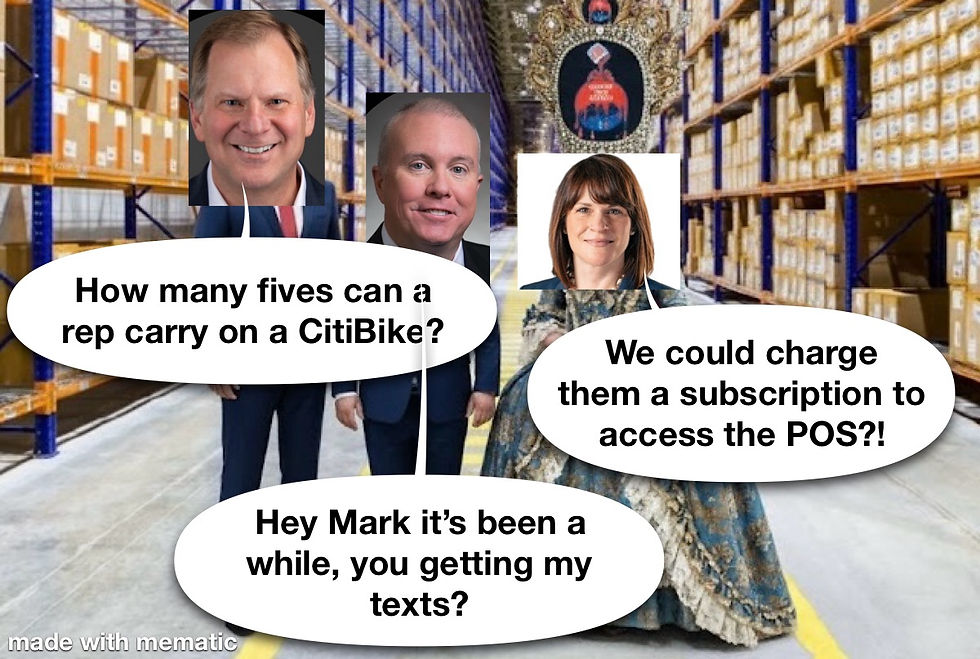Watch What You Call Me!
- Mark Lipton

- Nov 4, 2025
- 3 min read
Updated: Nov 5, 2025
When paint manufacturer Kelly-Moore was shuttered during the Charles Gassenheimer affair the victims were spread across paint’s landscape, the vendors and employees of that company who had become incidental to Gassenheimer’s greed.
And amongst the employees was a special class of victims, ones who lost more than just their jobs when Kelly-Moore was exploded.
In the months leading up to Kelly’s demise field reps whose vehicles came off lease were instructed to acquire their own car, truck or minivan to replace the one the company had been providing. Going forward they were told that Kelly-Moore would reimburse them for that expense rather than provide a vehicle, which worked fine until Gassenheimer's orderly wind down.
When Gassenheimer lied those reps were left with less than nothing as both their income and reimbursements evaporated simultaneously, while their obligation for the vehicles went on. A double whammy which left several I spoke with paying more to maintain that vehicle than they were receiving in unemployment benefits.
While Gassenheimer walked away from it all.
I was reminded of those Kelly-Moore reps recently when employees at Pittsburgh Paints shared details of that company’s new vehicle policy. One which requires field employees to supply their own vehicle while doing the company's work with the Pittsburgh reimbursing those expenses (until they tell them that they won’t).
Taking a blade from Charles Gassenheimer’s guillotine.

THE coercion doesn’t necessarily imply that the end is near for Pittsburgh, though Carson always preparing for that eventuality. Private equity's proclivity for shifting liabilities so that when the final counts are made they're left holding all the gold and someone else is holding all the rocks.
Employees most at-risk to end up like the reps at Kelly-Moore are the reps whose territories include unprofitable stores, which are likely to be closed in the coming months making those positions tenable. Already apprehensive of entering a challenging jobs market they’re now forced into Sophie’s Choice: buy a new vehicle and hope Carson doesn't fire them or risk being terminated for failing to provide a car.
A ruthless abuse of his status for which Carson should be ashamed.
Most reps at Pittsburgh cover more than six stores with some covering as many as ten depending on the region. The territories can be so expansive that some rep drive 1,000 miles each week, adding to the reasons Carson wants employees to own the cars: the high milage and extreme wear on a paint rep’s car leaves little value at the end of their usefulness.
Otherwise Carson would keep them for himself.
A millionaire imperiling the financial security of their employees for the enrichment of a billionaire master is vice, a carnal lust for money which exposes Carson's defect. By forcing employees to take actions contrary to their interests as a condition of their employment Carson puts them on the platform with Sophie, where all choices lead to some kind of hell.
And they call me a douchebag?

With their earnings for the third quarter Sherwin-Williams also announced a 7% price increase effective January 1st, surprising in its size considering current economics of soft demand for Sherwin products which is expected to stay “softer for longer” according to CEO Heidi Petz.
With Carson one of paint’s two biggest problems.
It was Sherwin’s seventh price increase since 2021 totaling 53.5%, making inflation the only evidence in support of Petz’s claim that her company has grown market share in the residential-repaint segment for 16 consecutive quarters. A dubious proclamation which would not survive much scrutiny.
Sherwin’s biggest competitor in rezi-repaint remains Benjamin Moore, who in that same era raised prices five times totaling just 31.5% with no rumor of an increase to date for ’26 making one before spring seem unlikely.
Which of course painters have noticed. Those smaller increases have conspired Sherwin’s compounding increases to significantly narrow the spread between Benjamin Moore and Sherwin-Williams paints. That affect allowing products such as Ultra Spec to take hold in the market nationally.
On the west coast Dunn Edwards is strong in rezi-repaint as are most of several dozen regional manufacturer/retailers scattered around the country who like Benjamin Moore, do not report their results. Aggregated they represent a data gap wide enough to ensure Petz has no idea how fast the rezi-repaint segment is growing.
But doesn't stop her from saying she's growing faster.



